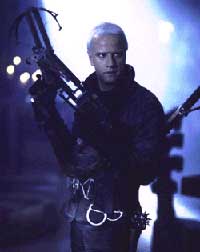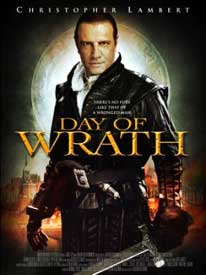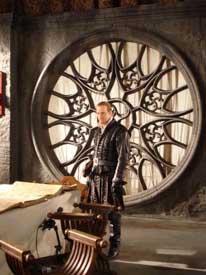 The medieval poem lends its title to Beowulf (1999), together with some elements of the story, but transposed into a timeless future which has reverted to medievalism. The medieval poem lends its title to Beowulf (1999), together with some elements of the story, but transposed into a timeless future which has reverted to medievalism.
Christopher Lambert plays Beowulf, a warrior who rides into a fortress town which needs a hero to free it of a ferocious monster.
Heroic fantasy is hard to do cinematically -- on the cheap one can't get the costumes & sets, but even a big budget can't make up for lack of vision.
Considering that Beowulf is a low budget film, it does a remarkable job of overcoming limitations, & it does have a vision.
It's no great work of art, it has "unimportant" oozing from it, but it had me pretty much convinced for the duration of the story.
The film deserves bonus points for being so convincing on the cheap, & for keeping a straight face throughout so that the viewer can care about the characters. And it's greatly fascilitated by Christopher Lambert's almost magical ability to wear outrageously flambouyant costumes & look splendid rather than goofy.
 Spain, 1542, time of the Inquisition. In Day of Wrath (2006) a masked slayer is abroad. The crimes are investigated by the Lord Sheriff Ruy de Mendoza (Christopher Lambert). Evidence & corpses have a habit of vanishing, with servants of the Inquisition ready to insist each murder in turn never occurred.
Spain, 1542, time of the Inquisition. In Day of Wrath (2006) a masked slayer is abroad. The crimes are investigated by the Lord Sheriff Ruy de Mendoza (Christopher Lambert). Evidence & corpses have a habit of vanishing, with servants of the Inquisition ready to insist each murder in turn never occurred.
The sheriff is an alcoholic & everyone worrying about his drinking seems out of time & place. His fearless insults to the Inquisitor are not merely foolish, they're suicidal. But if you buy all that, there remains the ability of the conspirators to fully clean up blood & guts from cobbled stones within minutes of each gory muder. This is not the least bit likely, & is alone sufficient to cause the whole story to fall apart.
If a viewer makes the heroic effort to overlook the story's lapses from the credible, it's a beautifully staged thing, a mysterious tale of medieval murder, detection, & conspiracy, with Lambert in particular looking swell in costume.
The masked assassin, a Hungarian mercenary (Laszlo Aron), is a superior swordsman. The brutally realistic swordplay decorates the tale giving it a thrilling swashbuckling tone. The masked Count of Vallegos kills for pay, but will never speak against those who hire him, adhering to the code of his profession.
 He will turn out to be the hireling of the least likely figure in the story. And the plethora of hidden identities will eventually lead the sheriff to his own front door & his own identity, in a world of growing paranoia & religious hatred. He will turn out to be the hireling of the least likely figure in the story. And the plethora of hidden identities will eventually lead the sheriff to his own front door & his own identity, in a world of growing paranoia & religious hatred.
The mystery centers around a list of Jewish names, which turn out to be the real names of certain noble families who are secretly Jews.
The Count & the sheriff are both heroic figures, so despite the story's awful lapses in logic, it has a sophisticated sense of heroism that can pit two great men against one another.
It could've been a wonderful swashbuckling murder mystery, but every time it just about reaches to the point of captivation, the script posits something else ridiculous.
The accidental slaying of the raving antisemitic wife was a total cop-out, for instance. If the story had been told well, the sheriff would've been cornered into killing her to save the children she was on the verge of "cleansing."
The writing at that point was actually cowardly. And a brave tale requires brave authorship. The tragedy is one can almost see something of the quality of The Name of the Rose (1986) imbedded in these excellent performances & serious content, but it's ruined by a much-too-imperfect script.
copyright © by Paghat the Ratgirl
|

